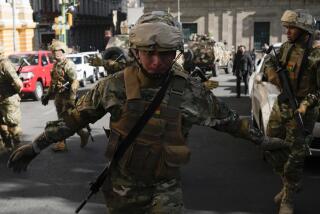Necessary Restraint
- Share via
The Bush Administration showed necessary restraint Tuesday in keeping U.S. troops out of the fighting during a short-lived coup attempt against Panama’s Gen. Manuel Noriega. The situation was too dangerous, too fluid and over far too fast for anyone to be certain that American force would have made a difference.
The failed coup marked the second time dissident members of the Panamanian Defense Forces have tried to oust Noriega, the country’s military commander and de facto ruler. The latest failure could strengthen the dictator’s hand in the short term, because Noriega will now be back on his guard and looking to purge not only officers involved in the coup, but any of their colleagues whose loyalty he might suspect.
But in the long run, prospects for Noriega are not so sanguine. Despite the reportedly vicious purge he carried out in early 1988, after the first coup failed, there obviously is still serious opposition to him inside the Defense Forces. And it persists despite the Panamanian strongman’s attempts to co-opt or coerce all officers he cannot corrupt. Whether this anger with Noriega stems from personal rivalries or frustration over Panama’s financial turmoil, it is cause for hope among Noriega’s opponents. Because of the weakness of civilian institutions in Panama, the military is the only faction in the country strong enough to oust Noriega if its leaders decide he is a liability. To that extent, the Administration’s strategy of emphasizing that the United State’s argument is with Noriega, and not the Defense Forces, seems to be effective.
But in the aftermath of Tuesday’s debacle, it would be wise to make that point more quietly than has been done in the past, when even President Bush has spoken out. Such public posturing seems to practically invite coups. And if they fail, it is perceived as a failure of U.S. policy, even if this country is not directly involved--as U.S. officials claim was the case this time.
The United States helped create the monster Noriega has become, so it has an obligation to help remove him. But for a variety of moral, geopolitical and practical reasons, ousting him cannot be accomplished as quickly or easily as some of his opponents might like. It is understandable that they sometimes become frustrated at the slow pace, especially at times like this. But the strategy of isolating Noriega diplomatically and financially, as the United States and its allies in the Western Hemisphere are doing, still offers the best chance of success in the long run.
More to Read
Sign up for Essential California
The most important California stories and recommendations in your inbox every morning.
You may occasionally receive promotional content from the Los Angeles Times.













